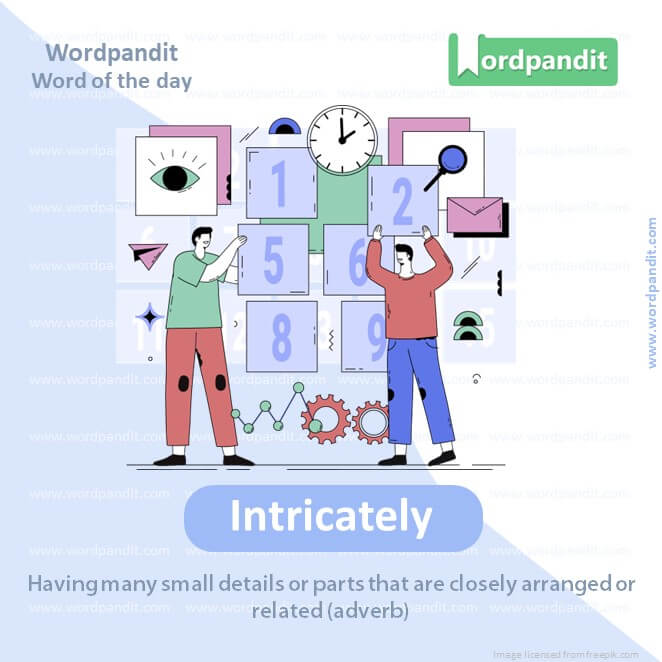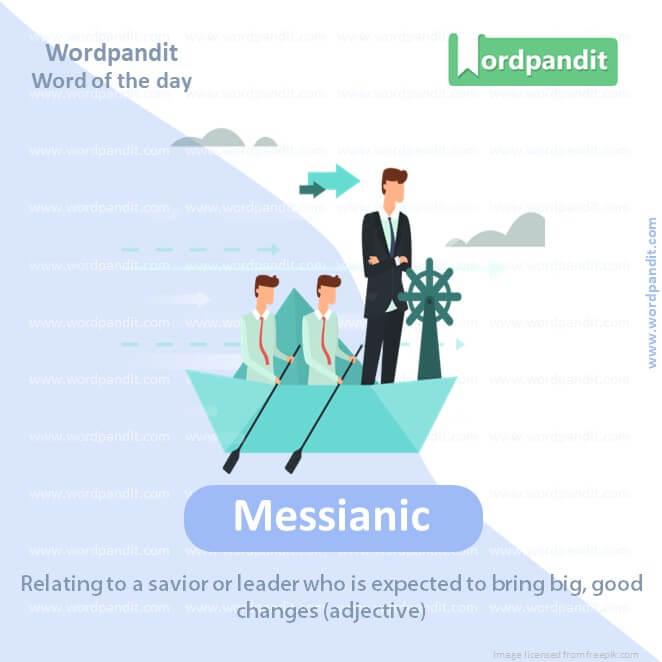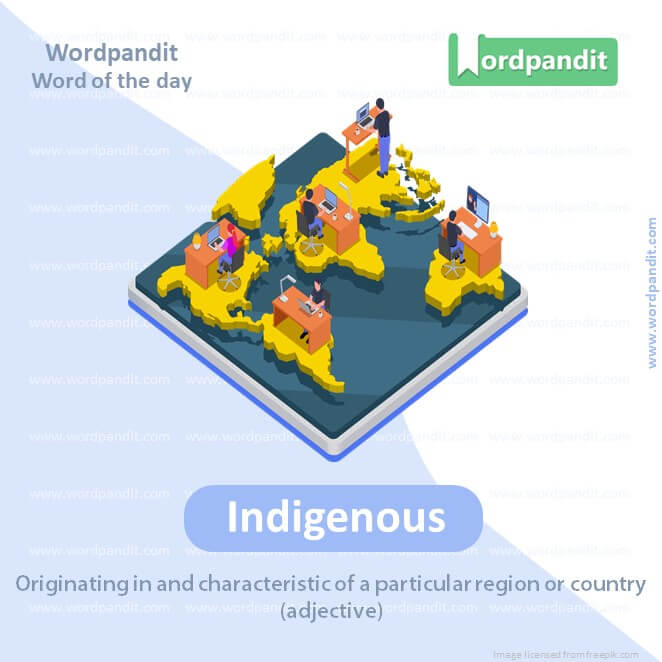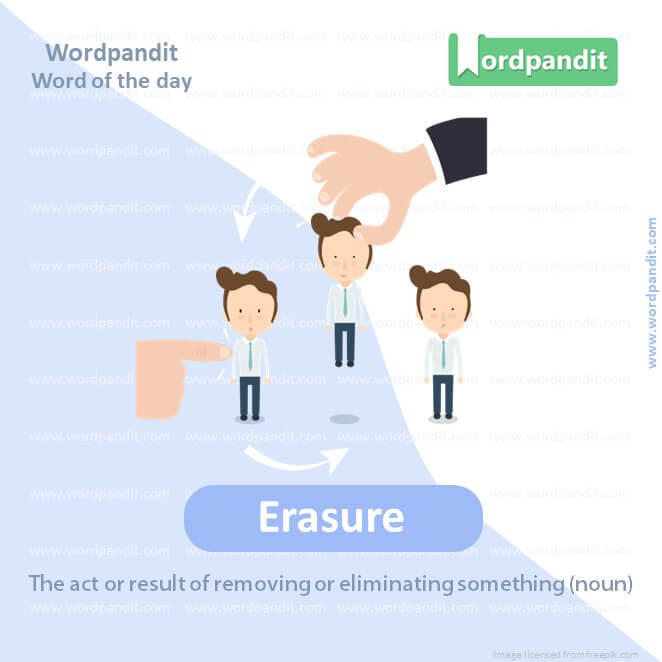Daily Vocabulary Words: List of Daily Used Words in Leading International Newspapers
Hi there. Welcome to this special section @ Wordpandit.
Our endeavour here is very simple: to highlight important daily vocabulary words, which you would come across in leading newspapers in the country. We have included the following newspapers in our selection:
• The New York Times
• The Washington Post
• Scientific American
• BBC
• The Guardian
• Psychology Today
• Wall Street Journal
• The Economist
We are putting in extensive work for developing your vocabulary. All you have got to do is be regular with this section and check out this post on a daily basis. This is your repository of words that are commonly used and essentially, we are posting a list of daily used words. Hence, this has significant practical application as it teaches you words that are used commonly in leading publications mentioned above.
Visit the website daily to learn words from leading international newspapers.

WORD-1: Intricately
CONTEXT: Israelis are realizing that Hamas’s success is intricately tied to the government’s colossal failures.
SOURCE: Al Jazeera
EXPLANATORY PARAGRAPH: Imagine you have a big box of crayons and you draw lots of tiny lines, squiggles, and patterns on a paper. When there’s so much detail and it’s all mixed together, we say it’s drawn “intricately.” It means there’s a lot of detail in something and it’s a little complicated.
MEANING: Having many small details or parts that are closely arranged or related (adverb).
PRONUNCIATION: in-trick-at-lee
SYNONYMS: complexly, detailedly, elaborately, finely, minutely, precisely, detailedly.
USAGE EXAMPLES:
1. She drew the flower intricately on her notebook.
2. The necklace was intricately designed with tiny beads.
3. Grandma’s lace is always intricately made.
4. The puzzle was intricately detailed, making it hard to solve.

WORD-2: Manoeuvre
CONTEXT: Netanyahu’s strategy has always been to allow Hamas room for manoeuvre in order to weaken the Palestinian Authority in Ramallah and Palestinian society more generally.
SOURCE: Al Jazeera
EXPLANATORY PARAGRAPH: Imagine you’re playing with toy cars and you’re trying to move one car between two other cars without touching them. That special move you do with your toy car is called a “manoeuvre.” It means to move or handle something carefully.
MEANING: A controlled change in movement or direction (noun); To move or handle something with skill (verb).
PRONUNCIATION: muh-noo-ver
SYNONYMS: move, operation, stratagem, tactic, shift, manipulate, guide.
USAGE EXAMPLES:
1. The driver made a tricky manoeuvre to park the car.
2. The airplane’s manoeuvre amazed the audience.
3. He learned how to manoeuvre the boat during his summer classes.
4. It was hard to manoeuvre the big cart through the crowded market.

WORD-3: Messianic
CONTEXT: And that of course has brought up the key question of whether Netanyahu and his messianic government can survive the fallout of the brutal attack.
SOURCE: Al Jazeera
EXPLANATORY PARAGRAPH: Imagine someone who everyone thinks will come and save the day, like a superhero! When someone is called “Messianic,” it means people believe they’re very special and can make everything better.
MEANING: Relating to a savior or leader who is expected to bring big, good changes (adjective).
PRONUNCIATION: mess-ee-an-ic
SYNONYMS: redemptive, savior-like, saving, redeeming, transformative, visionary, prophetic.
USAGE EXAMPLES:
1. The people had a Messianic belief in their new leader.
2. The movie depicted a Messianic figure who saved the city.
3. Many followed him due to his Messianic promises.
4. She has a Messianic vision for the company’s future.

WORD-4: Indigenous
CONTEXT: Over the past few days, Palestinians have proved, once again, that they won’t easily give up their indigenous claim to and sovereignty over the land stolen from them.
SOURCE: Al Jazeera
EXPLANATORY PARAGRAPH: You know how some animals or plants are from a specific place and have always been there? Like kangaroos in Australia? When something or someone originally comes from a certain place and has been there for a very long time, we say they are “indigenous” to that place.
MEANING: Originating in and characteristic of a particular region or country (adjective).
PRONUNCIATION: in-dij-uh-nus
SYNONYMS: native, local, original, endemic, aboriginal, ancestral, autochthonous.
USAGE EXAMPLES:
1. The indigenous plants thrive best in this environment.
2. There are many indigenous tribes in the Amazon rainforest.
3. The festival celebrates the traditions of indigenous people.
4. We should respect and protect indigenous cultures.

WORD-5: Erasure
CONTEXT: Recently, efforts to normalize relations between Israel and Arab states, and especially between Israel and Saudi Arabia, have intensified this erasure.
SOURCE: Al Jazeera
EXPLANATORY PARAGRAPH: Imagine you’re drawing with a pencil and you make a mistake. You’d use an eraser to remove it, right? “Erasure” is the act of erasing or removing something completely.
MEANING: The act or result of removing or eliminating something (noun).
PRONUNCIATION: ih-ray-shur
SYNONYMS: deletion, removal, elimination, obliteration, extinction, wiping out, annihilation.
USAGE EXAMPLES:
1. The erasure of old traditions is a concern for many.
2. The artist’s mistake was visible even after erasure.
3. Old files were up for erasure to make space.
4. The erasure of the blackboard marked the start of a new lesson.
WORD-6: Slaughtered
CONTEXT: Israel has just experienced the worst day in its history. More Israeli civilians have been slaughtered in a single day than all the civilians and soldiers Israel lost in the 1956 Sinai war, the 1967 six-day war and the 2006 second Lebanon war combined.
SOURCE: The Guardian
EXPLANATORY PARAGRAPH: Imagine you have toy soldiers and you pretend one group of soldiers wins a big battle and the other group loses really badly. When one group wins very easily and the other loses by a lot, in real life we might say the losing side was “slaughtered.” But remember, it’s not a nice word and can be used to talk about hurting animals or people.
MEANING: To kill in a violent or brutal manner (verb); A very easy and decisive victory (noun).
PRONUNCIATION: slot-erd
SYNONYMS: butchered, annihilated, massacred, destroyed, defeated, overwhelmed, crushed.
USAGE EXAMPLES:
1. The team was slaughtered in the final match.
2. Historical records speak of villages being slaughtered during wars.
3. The lion slaughtered its prey swiftly.
4. The boxer slaughtered his opponent in the first round.
WORD-7: Immense
CONTEXT: This means the Palestinians, too, are now facing immense danger. The most powerful country in the Middle East is livid with pain, fear and anger.
SOURCE: The Guardian
EXPLANATORY PARAGRAPH: Imagine a cake that’s as big as your house! That would be a HUGE cake, right? When something is really, really big or a lot, we can call it “immense.”
MEANING: Extremely large or great in size, amount, or degree (adjective).
PRONUNCIATION: ih-mens
SYNONYMS: vast, huge, enormous, gigantic, colossal, massive, tremendous.
USAGE EXAMPLES:
1. The mountain’s size was truly immense.
2. She felt an immense gratitude towards her teacher.
3. The universe is immense, with countless stars and galaxies.
4. His contribution to science had an immense impact.
WORD-8: Disengagement
CONTEXT: After the failure of the peace process, Israel’s next experiment in Gaza was disengagement.
SOURCE: The Guardian
EXPLANATORY PARAGRAPH: Imagine you’re playing with two toy blocks and you decide to separate them so they’re not stuck together anymore. “Disengagement” is like separating or letting go of something.
MEANING: The act of releasing or detaching; withdrawing involvement (noun).
PRONUNCIATION: dis-en-gayj-ment
SYNONYMS: detachment, release, withdrawal, separation, disconnection, disentanglement, severance.
USAGE EXAMPLES:
1. His disengagement from the project was sudden.
2. The machinery requires disengagement before maintenance.
3. There was a call for disengagement of troops from the border.
4. Her disengagement from the group was noticeable.
WORD-9: Coexistence
CONTEXT: Netanyahu pioneered another experiment. Since peaceful coexistence had failed, he adopted a policy of violent coexistence.
SOURCE: The Guardian
EXPLANATORY PARAGRAPH: Imagine you have a toy box with both teddy bears and toy cars. They’re different, but they all stay in the same box together without any problems. “Coexistence” is like that: different things or people living together peacefully.
MEANING: Existing together at the same time or in the same place (noun).
PRONUNCIATION: co-ex-ist-ence
SYNONYMS: harmony, peace, simultaneity, concurrence, synchronicity, collaboration, cohabitation.
USAGE EXAMPLES:
1. The city is a model of coexistence between multiple cultures.
2. The forest is a delicate balance of coexistence among animals.
3. Their coexistence as neighbors was peaceful and friendly.
4. The conference discussed the coexistence of technology and nature.
WORD-10: Bourgeoisie
CONTEXT: The indiscreet charm of the British bourgeoisie clearly lay in its hot beverages.
SOURCE: The Guardian
EXPLANATORY PARAGRAPH: Let’s think of a city where there are people who own big shops or factories and live in nice houses. These people are not the richest, like kings or queens, but they’re not poor either. In history, we call this group of people “bourgeoisie.” They are usually the middle-class folks who have some money and power.
MEANING: The middle class, typically in reference to its perceived values or its materialistic concerns, especially in the context of social and political theory (noun).
PRONUNCIATION: boor-zhwa-zee
SYNONYMS: middle class, capitalists, tradespeople, townsmen, merchants, shopkeepers, proprietors.
USAGE EXAMPLES:
1. The revolution was seen as a clash between the working class and the bourgeoisie.
2. The growth of the bourgeoisie was evident in the city’s expanding markets.
3. Many novels of the 19th century depicted the lives of the bourgeoisie.
4. The bourgeoisie played a vital role in the city’s economic development.
Vocabulary Meaning
In the ocean of language learning, ‘vocabulary meaning’ is akin to the colorful coral reefs that add depth and vibrancy to communication. Yet, infusing our interactions with this vibrancy is often a challenge for many language learners. The crux lies in effectively deciphering and employing the ‘vocabulary meaning’.
Learning ‘vocabulary meaning’ isn’t about merely gluing words to their definitions. It’s about forming a deep understanding and connection with these words that transcends rote learning. To gain a comprehensive grasp of ‘vocabulary meaning’, one needs to navigate beyond textbook definitions and commit to exploiting diversified resources such as novels, films, music, articles, and digital content. This allows one to encounter vocabulary in a variety of contexts and actual usage, giving deeper insight into their meaning.
However, understanding ‘vocabulary meaning’ involves another essential aspect—memory retention. Techniques such as spaced repetition and the Leitner System offer effective methodologies to maintain and consolidate the ‘vocabulary meaning’. Additionally, leveraging mnemonic strategies can help etch words into your memory by linking them with unique stories or imagery that are personal and easily recallable.
Another way of mastering ‘vocabulary meaning’ is by immersing yourself in the language. Engage in regular conversations with native speakers if possible or utilize language exchange platforms to practice your skills. This not only bolsters your understanding of how the vocabulary is used but also helps articulate the ‘vocabulary meaning’ in the societal and cultural contexts.
In conclusion, gaining a robust grasp of ‘vocabulary meaning’ is a journey rather than an end goal. It requires dedication, perseverance and most importantly, a multi-faceted approach that includes diversified resources, effective memory strategies, and real-life application. With these strategies in place, the depths of ‘vocabulary meaning’ are no longer daunting but become an enchanting exploration of language.











